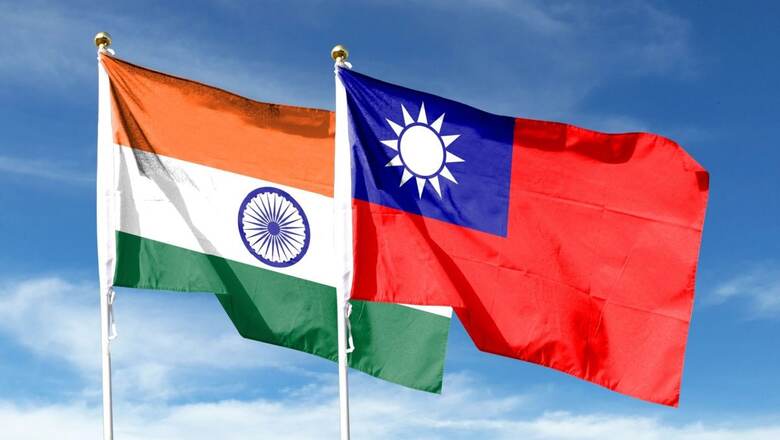
views
The evolving landscape of international relations has witnessed the pervasive influence of cognitive warfare reaching into diplomatic realms. Particularly pronounced in heated geopolitical regions such as the Indo-Pacific, diplomatic engagements between nations often reverberate beyond immediate stakeholders, impacting the interests of other states. As the spectre of alleged Chinese interference looms over Taiwan’s upcoming January 2024 elections, its transient influence on India’s diplomatic engagements becomes a focal point.
This incident serves as a paradigmatic recurrence, showcasing the pitfalls of reactive responses instead of strategic foresight, echoing previous diplomatic missteps in regions like the Maldives and Oman.
The Trajectory of Events
In the initial days of November 2023, discussions surrounding a mobility agreement between Taiwan and India took precedence. Confirmation from the official spokesperson of the Indian Ministry of External Affairs on November 9, 2023, marked the commencement of the discourse. A subsequent Bloomberg report on November 10 speculated on the potential recruitment of up to 100,000 Indians by Taiwan under the proposed agreement. By November 13, as Taipei officially acknowledged ongoing negotiations, the report had already permeated both social and traditional media in Taiwan.
Despite Taiwanese Labour Minister Hsu Ming Chun refuting claims, a racial undercurrent against Indians emerged, placing the Taiwanese government on the defensive. Within a mere 15 days, India and Taiwan found themselves issuing clarifications and engaging in damage control, overshadowing the intended mobility agreement. As December came to a close, the Taiwanese government’s categorical denial of a significant influx and the absence of clarity on the Memorandum of Understanding’s finalisation were attributed to the prevailing anti-mobility sentiment, shaping the government’s stance in the lead-up to the January 2024 Presidential elections.
Tracing the Chinese Interference
The genesis of the controversy surrounding the mobility agreement remains enigmatic—whether a meticulously crafted disinformation campaign or the release of genuine information out of context remains uncertain. However, the diffusion and response to this claim warrant examination. The Taiwanese government labelled the panic-inducing claim as a “textbook example of cognitive warfare and information campaign.”
The recent surge of racist remarks belittling Indian workers bears the hallmarks of #PRC cognitive warfare. It’s a devious move to tarnish our national image & strain #Taiwan–#India relations, but the attempt to destroy goodwill in the #MilkTeaAlliance won’t prevail! pic.twitter.com/8RHbwQUXmr— 外交部 Ministry of Foreign Affairs, ROC (Taiwan) (@MOFA_Taiwan) November 21, 2023
Reports implicated the People’s Republic of China (PRC) in fuelling confusion through modularised messages, with thousands of Facebook accounts following a distinct pattern. The China Times’ publication of a racist backlash against Indian migrants, purchased by pro-China Taiwanese tycoon Tsai Eng-Meng in 2008, added another layer to the orchestrated campaign. This was complicated by official media accounts attached to China’s Taiwan Affairs Office releasing videos questioning the Taiwanese government’s decisions. Notably, the numerical claim entered Taiwan’s media discourse even before official confirmation from the Taiwanese government.
Understanding Manipulation of Cognitive Environments
These events underscore three pivotal aspects. First, cognitive warfare transcends mere disinformation, embracing a broader spectrum. The distinction between disinformation and partial truth becomes inconsequential—the presentation’s ability to trigger collective social reactions is paramount. Once initiated, organic conversations sustain the propaganda, constituting ‘participatory propaganda’. Defending against such campaigns proves challenging, offering deniability to the originators.
Second, cognitive warfare exploits existing fault lines within a community. The social reaction to a potential migrant influx in Taiwan tapped into pre-existing racist stereotypes, emphasising the importance of cognitive resilience and awareness within and between states.
Third, this incident is not isolated but part of a broader cognitive campaign orchestrated by China against states perceived as counter to its regional and global interests. Hence, a response to Chinese cognitive campaigns shall require China’s regional or global objectives and vulnerabilities, instead of perceiving it from an India-centric lens. Collaboration from like-minded countries in monitoring, engaging, and responding to such threats could be mutually beneficial. In this case, for instance, the cognitive campaigns must be faced by the QUAD and QUAD+ countries as a collective – making cognitive awareness more expansive, and cognitive responses more effective.
Tejusvi Shukla is a Research Associate with the Centre for Indian Knowledge Systems at Chanakya University, Bengaluru, and Research Analyst with the Online Indian Journal of Peace and Conflict Resolution. Views expressed in the above piece are personal and solely that of the author. They do not necessarily reflect News18’s views.




















Comments
0 comment